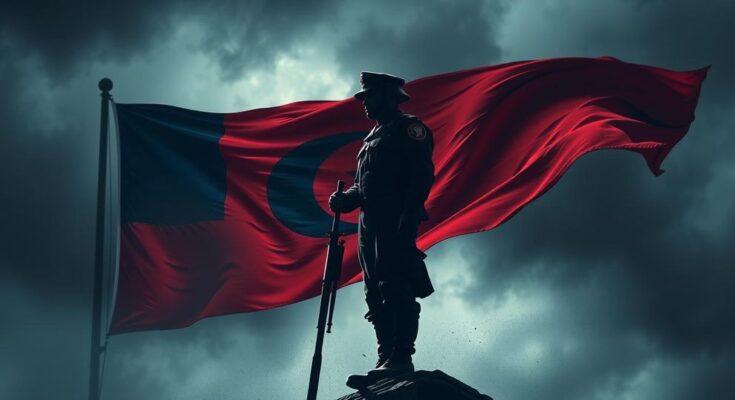The stability of the Bangladesh Army is critical for the nation’s sovereignty, especially following recent political upheavals. Ongoing domestic and foreign efforts aim to undermine the military’s credibility, risking political chaos. Historical examples illustrate the dire consequences of militaries becoming politicized. Bangladesh must prioritize the military’s independence, combat disinformation, and enhance civilian institutions to navigate these challenges and maintain national stability.
The military of a nation serves as a pivotal guardian of its sovereignty, and nations weakened internally, whether through political discord or external forces, often face dire consequences. Bangladesh has historically relied on its armed forces for both defense and political stability since its independence in 1971. At present, following the removal of Sheikh Hasina’s administration, the role of the Bangladesh Army is increasingly vital, yet it is currently under threat from numerous forces aiming to undermine its efficacy.
There has been a notable uptick in online campaigns and foreign media reports aimed at diminishing public trust in the military. As the army’s credibility falters, the stability of Bangladesh itself is jeopardized. Historical precedents illustrate that when a military encounters such crises, the nation likely descends into disarray rather than evolving into a robust democracy.
Recent weeks have seen an orchestrated effort to delegitimize the Bangladesh Army. Social media activists operating from abroad have made accusations of military interference in governmental decisions. A particular incident involved a National Citizen Party leader implying undue military pressure on politics, which drew backlash even within his own ranks.
These allegations are not trivial; they form part of a strategic design to undermine the military’s legitimacy, mirroring patterns observed in Turkey and Pakistan. Consumers of the political landscape must heed the lessons of history to prevent a similar fate in Bangladesh. The political turbulence following Sheikh Hasina’s regime in 2024 has already been exploited by her loyalists who strive to incite public discontent against the military.
Partisan assaults on the military are becoming normalized, which poses an existential risk to the nation. Historical examples, such as Myanmar’s Tatmadaw and Venezuela under Hugo Chávez, exemplify the dangers of militaries entangled in political strife. While accountability of armed forces is essential, the trend toward character assassination does not aim for reform but for outright destruction.
In addition to domestic challenges, Bangladesh faces external influences fostering narratives of military discontent. Indian media’s speculation regarding internal divisions in the Bangladesh Army has been robustly denied by the military’s spokesperson. The interest of foreign entities in creating dissent is evident, as a fractured military makes Bangladesh susceptible to external pressures, thereby compromising national integrity.
To navigate these critical circumstances, it is essential for Bangladesh to maintain the military’s independence from political conflicts while reinforcing its integrity through effective governance. Political entities must acknowledge that unfounded attacks on the armed forces threaten both the integrity of the military and the nation. Disinformation must be countered, and those perpetuating false narratives must be held accountable to uphold national security without succumbing to political opportunism.
Equally imperative is the military’s maintenance of professionalism, avoiding involvement in governance or political confrontations. The administration must prioritize enhancing civilian institutions and governance competencies, significantly reducing the prospects of military intervention and thereby ensuring democratic stability. Additionally, foreign narratives magnifying internal schisms should be approached with caution to preserve national sovereignty in an intricate geopolitical landscape.
Bangladesh has arrived at a critical juncture; one path promises stability through a respected, non-partisan military, while the other threatens chaos from infighting and distrust. The imperative to resist any attempts to politicize and undermine the military is necessary—not out of unyielding loyalty but from logical necessity. A nation devoid of a strong, cohesive military will struggle to survive. Ultimately, survival is of paramount importance for Bangladesh.
In conclusion, the integrity and stability of the Bangladesh Army are crucial for the nation’s future. Foreign and domestic threats seeking to undermine the military must be addressed with urgency and diligence. By reinforcing the military’s apolitical stance and prioritizing civilian governance, Bangladesh can navigate this tumultuous phase successfully. The focus must remain on preserving national sovereignty and ensuring that the military continues to serve as a pillar of stability amidst challenging times.
Original Source: www.nation.com.pk




